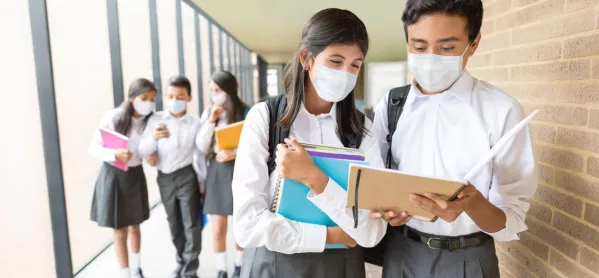Bring back face masks in class now, teachers demand

Teaching and support staff unions are urging the government to reintroduce the wearing of face masks in all areas of secondary schools to help curb the spread of the coronavirus.
In a joint statement, four education unions representing teachers and support staff have called for face coverings to be recommended again in secondary classrooms, as well as in school corridors and communal spaces, with “immediate effect”, amid the rise of the more transmissible Delta variant.
The NEU teaching union, along with support staff unions Unison, GMB and Unite, also called for resources to be made available to schools with poor ventilation ”to purchase carbon dioxide monitors and air filters”, and for outdoor lessons to be “encouraged wherever possible”.
Boris Johnson: Pupil masks in schools can come off from 17 May
Covid: Keep masks in schools until at least June
Unions: Don’t ‘rush’ to remove student face masks
In addition, the unions said students should be offered the Covid vaccine to protect against the virus.
The government said previously that the need to wear face masks in secondary school classrooms would cease for both students and staff from mid-May.
Covid: Call to reintroduce face masks in secondary schools
Despite opposition from unions and scientists, who had called for masks to remain in schools until at least 21 June, Boris Johnson said that students would also “no longer” be expected to wear their face coverings in corridors or communal areas.
However, the Department for Education clarified that staff should continue to use masks in communal areas such as the staffroom, where social distancing may not be possible.
Now ministers are being urged to immediately reintroduce the wearing of face coverings “in all areas of secondary schools”, in light of rising Covid cases.
In a joint statement, the four unions wrote: “Education unions are deeply concerned that secondary school-age students now have the highest rates of Covid-19 infection of all age groups, according to Public Health England (PHE) and the Office for National Statistics (ONS) data, and those rates are rising.
“At the weekend, the health secretary acknowledged that ‘a huge proportion of the latest cases are in children’, that they pass on the virus to the local community and face risks from long Covid.
“That means over the next few weeks more children and young people are likely to be off self-isolating and missing out on face-to-face education.
“PHE has advised that the Delta variant is more transmissible, can lead to more serious infections and vaccines may be less effective against it.
“Action must be taken now to make face-to-face learning safer over the remainder of the school term. Outbreaks mean bubbles, classes or entire year groups must be sent home. The priority must be to avoid any further loss of education.”
They added: “This includes the rollout of vaccinations for pupils, following the Medicines and Healthcare products Regulatory Agency (MHRA) view that these are safe for those aged 12 and over. This could help reduce transmission, school disruption and the risks of long Covid.
“Pupils should be offered the vaccine, as is already happening in many other countries, as soon as the Joint Committee on Vaccination and Immunisation (JCVI) gives its approval. Schools and colleges must be given the right support and resources to enable pupils to be vaccinated on site.”
The unions recommended that the government should “minimise the loss of face-to-face education” by:
- Reintroducing with immediate effect the requirement for students and staff to wear face coverings in all areas of secondary schools and colleges, including classrooms.
- Making resources available to schools with poor ventilation to purchase carbon dioxide monitors and air filters. Outdoor lessons should be encouraged wherever possible.
- Undertaking an urgent review of the guidance on bubbles and the isolation of contacts, given the increased transmissibility of the Delta variant.
- Releasing the data on the number of cases of the Delta variant in education settings, not just figures concerning outbreaks.
In response, a government spokesperson said: “Attendance in schools remains high, and the data shows the steps we are taking to keep outbreaks of the Delta variant under control in schools are working.
“On top of robust measures in place across the country, such as increased ventilation in classrooms and keeping to small group bubbles, we have increased the availability of testing for staff and pupils in families in areas of high prevalence of the variant.”
You need a Tes subscription to read this article
Subscribe now to read this article and get other subscriber-only content:
- Unlimited access to all Tes magazine content
- Exclusive subscriber-only stories
- Award-winning email newsletters
Already a subscriber? Log in
You need a subscription to read this article
Subscribe now to read this article and get other subscriber-only content, including:
- Unlimited access to all Tes magazine content
- Exclusive subscriber-only stories
- Award-winning email newsletters
topics in this article



